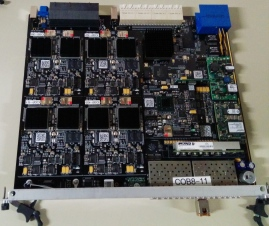The RCE Platform Technology (RPT) is a framework for the development and deployment of large-scale Data Acquisition Systems (DAQ). RPT has, as its fundamental premise, that application-specific, arbitrarily-sized DAQ systems may be constructed through derivation from a small number of generic, reusable building blocks. For the RPT, these blocks are the RCE (Reconfigurable Cluster Element), a low-power, generic, computational element employing System On Chip (SOC) technology; the CI (Cluster Interconnect), a small-footprint, multi-port, 10-Gigabit Ethernet switch used to inter-connect RCEs, and ATCA, a PICMG developed packaging standard, which acts as the physical substrate for both RCE and CI.
The RPT framework provides, in addition to its hardware infrastructure, a host based, cross-development, software development kit (SDK), with which users can write application-specific software to deploy to the RCE. With its extensibility, modular design and range of deployment topologies, RPT is a flexible solution to many data acquisition problems. Participants in the RPT Workshop will be introduced to the framework: its design, its toolchain for development and deployment, and its SDK. The morning session is lecture-based, though with hardware in the classroom for demonstration by the presenters. The afternoon session is hands-on, with participants able to proceed through a series of development exercises, starting with a "Hello world" exercise, which demonstrates the programmer's development cycle and ending with an exercise which demonstrates the plugin interface and employs the 10-Gigabit Ethernet interlink between RCEs.
Assumptions and Prerequisites: Participants are assumed to have experience developing hardware and embedded software for real-time data acquisition systems, familiarity with Linux, programming experience with either C or C++, and basic knowledge of networking principles. No familiarity with ATCA or firmware (VHDL) development are assumed.
Participants will connect to demonstration host machines during the morning and afternoon sessions, and should therefore bring their own laptop with local WiFi connectivity.
